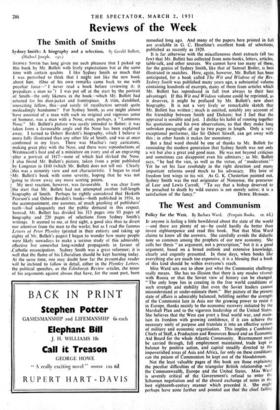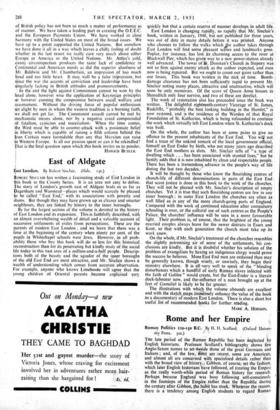The West and Communism
Policy for the West. By Barbara Ward. (Penguin Books. HI. 611.)
IF anyone is feeling a little bewildered about the state of the world —and there are plenty of us—he could hardly do better than invest eighteenpence and read this book. Not that Miss Ward claims to know all the answers. She carefully avoids the didactic note so common among the prophets of our new economy. She calls her thesis " an argument, not a prescription," but it is a good argument, based on a broad outlook and extensive knowledge, clearly and cogently presented. In these days, when books like everything else are much too expensive, it is a blessing that a book of this kind should be within everyone's reach.
Miss Ward sets out to show just what the Communist challenge really means. She has no illusion that there is any modus vivendi with Russia or that the Soviet view of history can be changed. "The only hope lies in creating in the free world conditions of such strength and stability that even the Soviet leaders cannot misunderstand or under-estimate them." Her picture of the present state of affairs is admirably balanced, belittling neither the strength of the Communist lure in Asia nor the growing power to resist it in Europe, thanks mainly to the economic recovery initiated by the Marshall Plan and to the vigorous leadership of the United States. She believes that the West can avert a final world war, and main- tain its freedom with growing confidence, if it can achieve the necessary unity of purpose and translate it into an effective system of military and economic organisation. This implies a Combined Chiefs of Staff, a Production and Resources Board and an Economic Aid Board for the whole Atlantic Community. Rearmament must be carried through, full employment maintained, trade kept in balance by positive action, and capital steadily directed to the impoverished areas of Asia and Africa, for only on these conditions can the poison of Communism be kept out of the bloodstream.
Not the least valuable pages of this book are those explaining the peculiar difficulties of the triangular British relationship with the Commonwealth, Europe and the United States. Miss Ward is severely critical of the Government's refusal to enter the Schuman negotiation and of the absurd exchange of notes in the best eighteenth-century manner which preceded it. She might perhaps have none further and pointed out that the chief failing
of British policy has not been so much a matter of performance as of manner. We have taken a leading part in creating the O.E.E.C. and the European Payments Union. We have worked in close harmony with the United States on most of the broad issues. We have up to a point supported the United Nations. But somehow we have done it all in a way which leaves a chilly feeling of doubt whether in the last resort we really care very much about either Europe or America or the United Nations. Mr. Attlee's cold, canny circumspection produces the same lack of confidence in Continental and American minds as did the superior aloofness of Mr. Baldwin and Mr. Chamberlain, an impression of too much bead and too little heart. It may well be a false impression, but since the war the accents of conviction and leadership have been sangularly lacking in British attitudes and pronouncements.
' In the end the fight against Communism cannot be won by the head alone, however wise the application of Keynesian principles Or however cunning the compromise between socal. welfare and rearmament. Without the driving force of popular enthusiasm het alight by men in whom the western tradition is a burning faith, we shall not get far. The Communist assault cannot be met by mechanistic means alone, nor by a negative creed compounded of fatalism, cynicism and materialism. When the time comes, the West must be able to counter-attack with a passionate belief in liberty which is capable of raising a fifth column behind the Iron Curtain more formidable than any that Marxism can raise in Western Europe. Is all our passion spent or can it be rekindled? hat is the final question upon which this book invites us to ponder. HAROLD BUTLER.



































 Previous page
Previous page